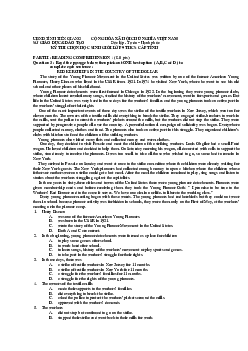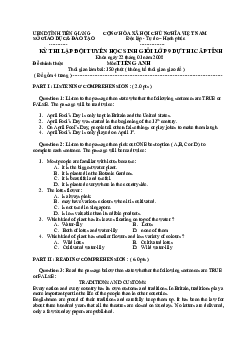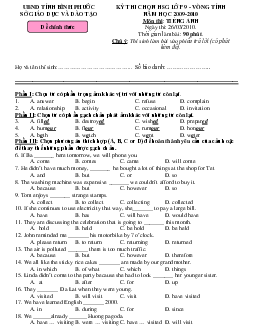








Preview text:
Së GD&§T Qu¶ng Ninh kú thi chän häc sinh giái CẤP tØnh
líp 9 n¨m häc 2009 - 2010
§Ò thi CHÍNH THỨC
(Đề thi này có 7 trang)
Ch÷ ký cña gi¸m thÞ M«n: TiÕng Anh (b¶ng A)
Thêi gian lµm bµi: 150 phót, kh«ng kÓ thêi gian giao ®Ò SBD: 1: Ngµy thi: 25/3/2010 Hä, tªn thÝ sinh: Sè ph¸ch Ngµy sinh: chấm lần 1: 2: N¬i sinh: Häc sinh trường: Ban coi thi: Số phách Điểm bài thi
Họ tên, chữ ký của hai người Sè ph¸ch chấm lần 1: chấm phúc khảo: chấm lần 1: chấm lần 1:
Bằng số: ……….……….……… 1: …………………………..……………………………… Bằng chữ:
2: ………………………….……..……………..………….
…………………….……………….…….. Số phách
Điểm bài thi chấm phúc khảo:
Họ tên, chữ ký của hai người chấm phúc khảo: chấm phúc khảo:
Bằng số: ……….………………..............….......….……… Bằng chữ:
1: …………………………..…………………………………
…………………….………………................……….…….……..
2: ………………………….………..……………..………….
Ghi chó: ThÝ sinh tr¶ lêi ngay vµo b i
à thi nµy. NÕu viÕt sai ph¶i g¹ch bá råi viÕt l¹i.
PART I. VOCABULARY AND GRAMMAR (7.0 pts)
I. Circle the letter A, B, C or D next to the word or phrase which best completes each sentence.
1. The weather has turned _____ .
A. coldy and windily B. coldly and windy C. cold and windy D. cold and windily 2. Nobody is ready,_____? A. is he B. isn’t he C. are they D. aren’t they
3. He was pleased to have the _____ to hear such a fine musician play his favourite piece of music. A. occasion B. possibility C. opportunity D. fate
4. _____ I had met him twice before, I didn’t recognise him. A. Although B. However C. If D. But
5. I wish you’d stop chatting and _____ with some work. A. get down B. get on C. come on D. come back
6. He won $ 200.000, _____ he gave his parents. A. half of which B. half of that C. half of them D. half of it
7. The bus company has _____ the fare by 50%. A. raised B. arisen C. rose D. risen
8. It’s time you _____ back to your work A. go B. went C. have gone D. shall go
9. There was no _____ in waiting longer than half an hour so we left. A. good B. point C. worth D. use
10. If we built more hospitals, we could _____ better care of people. A. get B. do C. give D. take
11. Twenty-five dollars _____ too much to pay for that shirt. A. is B. are C. were D. been
12. The kidnappers have been caught, and the child is no longer _____ danger. A. on B. in C. at D. of
13. Jim’s parents wouldn’t _____ him go to the demonstration. A. agree B. allow C. permit D. let
14. Tony always goes to work _____ his car. A. on B. by C. in D. with
15. Hoa is very good at _____ English A. speak B. to speak C. speaking D. speaks
16. My watch stopped some days ago. I have it _____ A. repaired B. repair C. repairs D. repairing
17. You have read this book, _____ ? A. have you B. haven’t you C. do you D. don’t you
18. He wanted to know if I _____ learning English A. like B. have liked C. will like D. liked
19. Be quiet! It’s rude to _____ people when they are speaking. A. interfere B. interrupt C. prevent D. introduce
20. It was not easy to understand her _____ to the situation. A. feelings B. conduct C. outlook D. reaction
II. Circle the letter A, B, C or D next to the word or phrase with the same meaning as the underlined part.
1. What would happen if the water resources were made dirty? A. run out B. restricted C. polluted D. destroyed
2. Most people who live in apartments are urban dwellers. A. of a village B. of a city C. wealthy D. famous
3. He was proud of his son’s accomplishment. A. first attempt B. endurance C. determination D. achievement
4. They extended the road for ten more miles. A. lengthened B. repaired C. planned D. constructed
5. It is risky to climb to the top of that tree. A. unusual B. normal C. dangerous D. brave
III. Underline and correct mistakes in the following paragraph. Each line has one
mistake. Write the correct one in the numbered blanks. (0) is an example.
The other day, when I was in London, I ran in an old friend of mine who 0. ___into__
had been at university with me. Although we hadn’t seen one another for 1. ________
ages and had lost touch, it was just like old times, and he told me all his new. 2. ________
He moved to London after leaving from university, and started to train as an 3. ________
accountant. He left after a few months because he hadn’t found it very 4. ________
interesting, and he didn’t feel like spending the rest of this life in an office. 5. ________
His parents were very helpful - they didn’t try to make him to carry on 6. ________
training as a chartered accountant, and said they will continue to support him 7. ________
despite of the fact that he didn’t have a job to go to. He soon found work 8. ________
do what he really wanted - writing for a TV show, after the first series, the 9. ________
producer let him to have his own TV show even though he was relatively 10. _______
young, and it turned out to be a great success.
IV. Use the correct form of the words in capital letters on the right column to complete
each of the numbered spaces on the left. (0) is an example. EXCHANGE VISITS
The most (0) effective way of learning a language is by
living in the country concerned, but parents should think (1) 0. EFFECT
………………………. before they send their children abroad.
Although some (2) …………………………. arrange visits for 1. CARE
children as young as ten, the (3) ……………………… of them 2. ORGANIZE
won’t be ready to stay away from home and deal with (4) 3. MAJOR
………………………. differences until they are in their teens.
Even then they will need a basic (5) ……………………… of the 4. CULTURE
language and some experience of foreign travel before they go. 5. KNOW
Exchange visits are a good way for (6) …………..………
to improve their language skills. It is a good idea for them to 6. TEENS
exchange (7) ………………………. before the visits. Host families 7. CORRESPOND
should not feel any (8) ……………………….. to provide an 8. OBLIGE
extensive program of (9) ………………………….. It is more 9. ENTERTAIN
important to make the guest feel welcome.
Travel can (10) …………………………. the mind, and 10.BROAD
exchange visits give young people experience of a different way of
life as well as a different language.
V. Use the correct form of the VERBS in brackets. Write your answers in the numbered spaces. (1.0 pt)
I (1- walk) ________________ along the deserted main street of a small seaside town in the
North of England (2- look)______________ for somewhere (3- make)_______________ a
phone call. My car (4- break)________________ down outside the town and I wanted to
contact the A. The street (5- run) ______________ parallel to the sea and (6-
join)_______________ to it by a number of narrow side streets. Low grey clouds (7-
drift)________________ off across the sky and there was a cold damp wind (8-
blow)________________off the sea which nearly threw me off my feet when I (9-
cross)_________________one of the side streets. It (10- rain)_____________________ for a long time. PART II. READING (7.0 pts)
I. Circle the letter A, B, C or D next to the right word(s) to complete the passage below
Are you one of the thousands of people who eagerly follow every new (1)_____ that
appears? Or are you one of those who go to the shops and just buy (2)_____ they can find in
their size that (3)_____ them? Or perhaps you order from a mail-order catalogue, and then
have to send everything back because nothing fits? Whatever kind of shopper you are, one
thing is certain. Everyone finds clothes important. (4)_____ a recent survey, people spend
more time (5)_____ buying clothes or thinking about buying them, or looking at them in
shop windows than they do on most other products, apart from food. And the reason is
obvious. Clothes are an important part of our appearance. At work, you may need to impress
a customer, or persuade the boss that you know what you are doing, and clothes certainly
help. Well dressed people, so they say, get on in the world. And as far as attracting the
opposite sex is concerned, clothes also play a vital role. (6)_____ a friend who has been
wearing the same old jacket or the same old dress suddenly appears in the (7)_____ fashion,
you can be sure that romance is in the air. And apart from work and romance, there are the
(8)_____ of sport, music and leisure on the way we dress. So excuse me while I (9)_____ on
my tracksuit and training shoes. I’m just dashing off (10)_____ some fast window-shopping. 1. A. appearance B. fashion C. uniform D. dress 2. A. whatever B. whoever C. whichever D. however 3. A. matches B. suits C. takes D. couples 4. A. On account of B. Because of C. According to D. Due to 5. A. but B. either C. or D. nor 6. A. If B. Because C. Although D. Unless 7. A. last B. minute C. latest D. complete 8. A. affects B. benefits C. conveniences D. influences 9. A. have B. dress C. wear D. put 10. A. in B. for C. to D. toward
II. Read the following passage and circle the letter A, B, C or D next to the best answers.
After two decades of growing student enrollments and economic prosperity, business
schools in the United States have started to face harder times. Only Harvard's MBA School
has shown a substantial increase in enrollments in recent years. Both Princeton and Stanford
have seen decreases in their enrollments. Since 1990, the number of people receiving
Masters in Business Administration (MBA) degrees has dropped about 3 percent to 75,000,
and the trend of lower-enrollment rates is expected to continue.
There are two factors causing this decrease in students seeking an MBA degree. The
first one is that many graduates of four-year colleges are finding that an MBA degree does
not guarantee a plush job on Wall Street or in other financial districts of major American
Cities. Many of the entry-level management jobs are going to students graduating with
Master of Arts degrees in English and the humanities as well as those holding MBA degrees.
Students have asked the question "Is an MBA degree really what I need to be best prepared
for getting a good job?" The second major factor has been the cutting of American payrolls
and the lower number of entry-level jobs being offered. Business needs are changing, and
MBA schools are struggling to meet the new demands.
1. What is the main focus of this passage? A. Jobs on Wall Street B. Types of graduate degrees
C. Changes in enrollment for MBA schools
D. How schools are changing to reflect the economy.
2. The phrase ' two decades" in the first paragraph refers to a period of: A. 10 years B. 20 years C. 50 years D. 100 years
3. The word "prosperity" in the first paragraph could best be replaced by which of the following? A. success B. surplus C. nurturing D. education
4. Which of the following business schools has NOT shown a decrease in enrollment? A. Princeton B. Harvard C. Stanford D. Yale
5. The phrase "trend of” in the first paragraph is closest in meaning to which of the following?
A. reluctance of B. drawback to C. movement toward D. extraction from
6. As used in the second paragraph, the word "seeking" could best be replaced by which of the following? A. examining B. avoiding C. seizing D. pursuing
7. Which of the following descriptions most likely applies to Wall Street?
A. A center for international affairs B. A major financial center C. A shopping district D. A neighborhood in New York
8. According to the passage, what are two causes of declining business school enrollments?
A. Lack of necessity for an MBA and an economic recession
B. Low salary and foreign competition
C. Fewer MBA schools and fewer entry-level jobs
D. Declining population and economic prosperity
9. The first paragraph is mainly concerned with which of the following?
A. Factors contributing to the decline in MBA students
B. A current trend affecting the nation's business schools
C. The difference between Harvard, Princeton, and Stanford
D. Two decades of hard times for business schools
10. As used in the second paragraph, the word "struggling" is closest in meaning to: A. evolving B. plunging C. starting D. striving
III. Read the following passage. Choose from the sentences (A-G) below which best fits in
each numbered gap (1-5). There is one extra sentence which you do not need to use. There
is an example at the beginning(0).
Carnival is definitely not a spectator sport. It’s very difficult to get carried away by the
atmosphere unless (0)___G___ and by that I mean wearing a disguise of some kind, even if
it’s nothing more than a mask or a funny hat. In fact, the number of people (1)_____ is
usually fairly small, so you will almost certainly be conspicious out of fancy dress. You are
bound to regret not having gone to a bit of trouble when (2)_____ having the time of their
lives. Ask a friend to lend you a costume if (3)_____. You may even find that (4)_____ . If
all else fails, you can always improvise with old streets and clothes, after all, you don’t have
to look spectacular, elegant or beautiful, but you should try to enter into the spirit of the festivities if (5)_____ .
A. you do not have one D. they are available for hire somewhere
B. who do not bother to dress up E. you want to enjoy them
C. who don’t want to make trouble F. you see every body else
G. you are taking part yourself
IV. Fill in each numbered space with one suitable word.
I’d like to talk about some of the problems that students face (1)___________ they
follow a course of study through the medium of English (2)_____________ English is not
their mother tongue. The problems can be (3)_____________ into three broad categories:
psychological, cultural and linguistic. The first two categories mainly affect those
(4)____________ come to study in Britain. I’ll comment only briefly on these two categories
and then spend most of the time looking at linguistic difficulties apply to everyone. Some of
the common psychological problems really involve fear of the unknown: for
(5)____________, whether one’s academic studies will be too difficult. Looking at the
cultural problems, we can see that some of them are of a very practical nature, e.g arranging
satisfactory accommodation. Others are less easy to define. (6)____________ largest
category seems to be linguistic. Let’s look at this (7)____________ some detail. Most
students, in their (8)______________ countries, will have little opportunity to practise using
(9)______________ . When foreign learners first have the opportunity to speak to an
English-speaking person they may have a shock: they often have great (10)_____________ in understanding.
PART III. WRITING: (6.0 pts)
I. Finish the second sentence in each pair in such a way that it means the same as the first one.
1. He has never been on board a ship before.
This is the first ……….…………………………..……………………………..…………..
2. David finds it easy to make friends.
David has ....……………………………………….………………………...…………….
3. Finish eating first, then you can watch TV.
You can’t watch TV……………………….…...………………………….……….……….
4. In spite of her tiredness, she managed to finish her work.
Although …………………………………………………………..………….…………….
5. No messages have come for me, have they?
There have ………..……………………………………………..………….………………
6. When he drinks a lot, he gets very bad.
The more……………………………………………………………………….……….......
7. Her wish is buying that villa but it’s too far expensive.
She wishes……………………………………………..………..……………….…………
8. My advice to you is to go to the doctor’s.
If I….……………………………………………………………..…………….……….….
9. A doctor is taking his temperature.
He is having…….…………………………….……………………….….…….…………..
10. I was not familiar with that kind of computer.
It was a …….……………………………………………………………….……..….…….
II. Use the word given in the brackets and other words as necessary to write the second
sentence in such a way that it is as similar as possible in meaning to the first one. Do not
change the form of the given word.
1. He drove so carelessly that he had an accident last month. (such)
……………………………………………………………………………………..…………
2. Dicken’s last novel was unfinished when he died. (without)
……………………………………………………………………………………..…………
3. Mark is too young to see the horror film. (enough)
…………………………………………………………………………………………..……
4. Everyone but Jane failed to produce the correct answer. (succeeded)
………………………………………………………………………………………..………
5. “How about going to the concert?” said John. (suggested)
………………………………………………………………………………………..………
III. Write a paragraph in which you suggest several ways to protect the environment of
your school (about 150 words).
…………………………………………………………………………………………………
…………………………………………………………………………………………………
…………………………………………………………………………………………………
…………………………………………………………………………………………………
…………………………………………………………………………………………………
…………………………………………………………………………………………………
…………………………………………………………………………………………………
………………………………………………………………………………………………….
…………………………………………………………………………………………………
…………………………………………………………………………………………………
…………………………………………………………………………………………………
…………………………………………………………………………………………………
…………………………………………………………………………………………………
…………………………………………………………………………………………………
…………………………………………………………………………………………………
…………………………………………………………………………………………………
…………………………………………………………………………………………………
…………………………………………………………………………………………………
…………………………………………………………………………………………………
………………………………………………………………………………………………….
___________hÕt___________
Së GD&§T Qu¶ng Ninh híng dÉn chÊm thi chän häc sinh giái tØnh líp 9 n¨m häc 2009 - 2010
§Ò thi CHÍNH THỨC
M«n: TiÕng Anh (b¶ng A)
I. VOCABULARY & GRAMMAR: (7,0 điểm)
I. 3,0 điểm. Mỗi câu đúng 0,15 điểm.
1.C 4.A 7.A 10.D 13.D 16.A 19.B
2.C 5.B 8.B 11.A 14.C 17.B 20.D 3.C 6.A 9.B 12.B 15.C 18.D
II. 1,0 điểm. Mỗi câu đúng 0,2 điểm. 1. C 2. B 3. D 4. A 5. C
III. 1,0 điểm. Mỗi câu đúng 0,1 điểm. 1. one another each other 6. to carry carry 2. new news 7. will would 3. leaving from leaving 8. despite of despite
4. hadn’t found didn’t find 9. do doing 5. this his 10. to have have
IV. 1,0 điểm. Mỗi câu đúng 0,1 điểm. 1. carefully 6. teenagers 2. organizations 7. correspondence 3. majority 8. obligation 4. cultural 9. entertainment 5. knowledge 10.broaden
V. 1,0 điểm. Mỗi câu đúng 0,1 điểm. 1. was walking 6. was joined 2. looking 7. were drifting 3. to make 8. blowing 4. had broken 9. was crossing 5. ran 10. had been raining
PART II. READING (7,0 điểm)
I. 2,0 điểm. Mỗi câu đúng 0,2 điểm.
1. B 2. A 3. B 4. C 5. B 6. A 7. C 8. D 9. D 10. B
II. 2,0 ®iÓm. Mçi c©u ®óng 0,2 ®iÓm. 1. C 2. B 3. A 4. B 5. C 6. D 7. B 8. A 9. B 10. D
III. 1,0 điểm. Mỗi câu đúng 0,2 điểm. 1. B 2. F 3. A 4. D 5. E
IV. 2,0 điểm. Mỗi câu đúng 0,2 điểm.
1. when 3. divided 5. example/ instance 7.in 9. English/ it
2. if 4. who 6. the 8.own 10. difficulties
PART IV. WRITING (6,0 điểm)
I. 2,0 điểm. Mỗi câu đúng 0,2 điểm.
1. This is the first time he has (ever) been on board a ship.
2. David has no difficulties/ not any difficulties (in) making friends.
3. You can’t watch TV until/ before you finish/ have finished eating.
4. Although she was tired, she managed to finish her work.
5. There have been no messages/ not been any messages for me, have there?
6. The more he drinks, the worse he gets.
7. She wishes she could buy that expensive villa.
8. If I were you, I would go to the doctor’s,
9. He is having a doctor take his temperature/ his temperature taken by a doctor.
10. It was a kind of computer which/that I was not familiar with/ with which I was not familiar.
II. 1,0 điểm. Mỗi câu đúng 0,2 điểm.
1. He was such a careless driver that he had an accident last month.
2. Dicken died without finishing his last novel.
3. Mark isn’t old enough to see the horror film.
4. Only Jane/ Jane was the only one who succeeded in producing the correct answer.
5. John suggested going to the concert.
III. 3,0 ®iÓm (Mở bài: 0,5 điểm; thân bài: 2,0 điểm; kết luận: 0,5 điểm).
Yªu cÇu thÝ sinh viÕt thµnh ®o¹n v¨n hoµn chØnh (cã më bµi, th©n bµi vµ kÕt luËn),
nêu một số hoạt động để bảo vệ môi trường ở trường học của em như: không ném rác
bừa bãi ở trong và ngoài lớp học; bỏ rác vào thùng rác; hàng ngày phải quét dọn lớp
học sạch sẽ; không viết, vẽ bậy lên mặt bàn, mặt ghế và trên tường; tích cực trồng cây
xanh trong trường và thường xuyên tưới nước cho cây... NÕu thÝ sinh viÕt ®óng chñ ®ề,
®óng ng÷ ph¸p, dïng tõ chuÈn x¸c, ®o¹n v¨n kh«ng qu¸ ng¾n (kho¶ng 150 tõ) míi cho ®iÓm tèi ®a. Tæng sè: 20 ®iÓm
---------------------------------------------
Document Outline
- Ngµy thi: 25/3/2010
- I. VOCABULARY & GRAMMAR: (7,0 điểm)
- I. 3,0 điểm. Mỗi câu đúng 0,15 điểm.
- Tæng sè: 20 ®iÓm



